Memphis passes 'Achieving Driving Equality' ordinance after Tyre Nichols' death
Police in Memphis will be directed not to make traffic stops solely for low-level offenses like improperly placed license plates or a single broken brake light after council members passed an “Achieving Driving Equality” ordinance Tuesday.
Memphis is only the sixth city in the country to have passed such an ordinance, said Councilwoman Michalyn Easter-Thomas, its sponsor.
“I wanted to ensure that if were asking a certain department or director to implement something that it’s actually clear what we’re asking and is also enforceable,” Easter-Thomas said.
The ordinance still allows police officers to stop drivers for “primary violations” and when there are both a primary and secondary violation. However, they may not stop a driver for only a secondary violation.
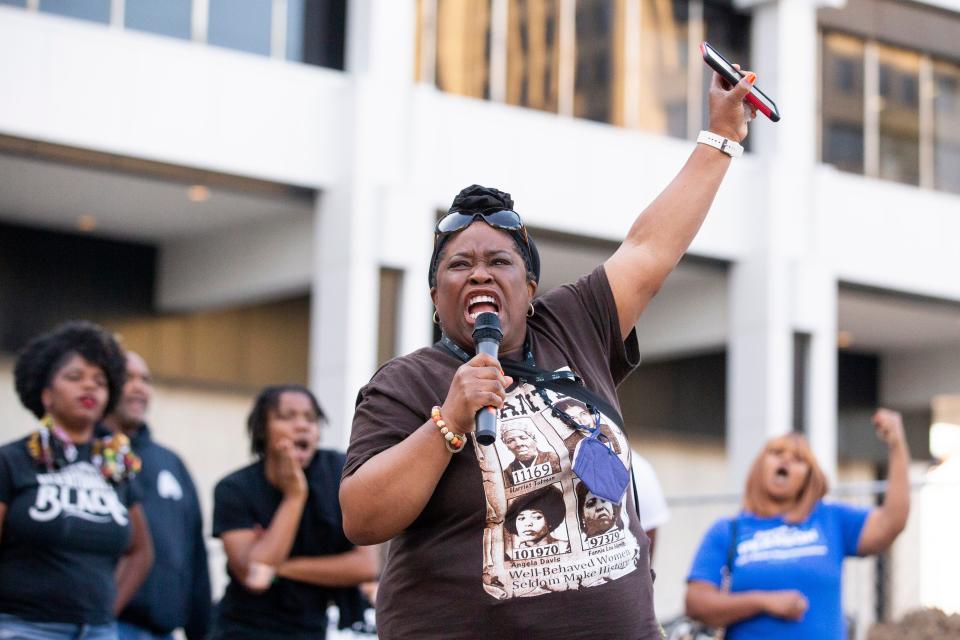
The goal is to reduce interactions between police and the public and to allow police to focus on serious crimes, not “poverty crimes,” Easter-Thomas said.
Secondary violations are defined as:
Vehicles with expired registration within 60 days of expiration
When a temporary registration permit is improperly located but still clearly displayed
When the registration plate is not securely fastened but is clearly displayed
When a single light (including brake, head or running light) is out
Loosely secured bumpers
“What this ordinance is, is surrounding the idea of pretextual stops, how they aren’t helpful and how they divert resources away from our clearly intentioned needs in our community such as dealing with crime and aiding our citizens," Easter-Thomas said.
State law still takes precedence over a local ordinance. Memphis Police Chief Cerelyn “CJ” Davis told council members that state laws will allow officers to stop cars for secondary violations “if there is a situation that’s an outlier.”
Nonetheless, the ordinance was a win for advocacy groups who have pushed for its passage since the death of Tyre Nichols, a 29-year-old Black man who died three days after being brutally beaten by Memphis police officers. Nichols was pulled over in a Jan. 7 traffic stop before officers forced him from his vehicle, tased, chased and beat him.
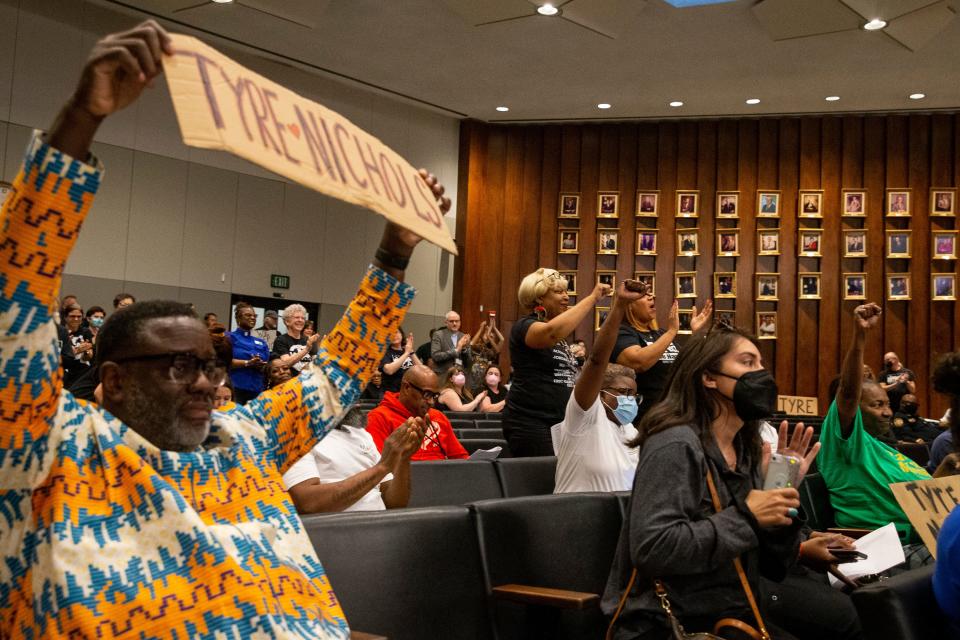
It was the final ordinance supported by advocacy groups like Decarcerate Memphis and Memphis Interfaith Coalition for Action and Hope to be passed by the Memphis City Council.
During the meeting, Rosalyn Nichols, an Interfaith Officer at the Metropolitan Inter-Faith Association (MIFA), asked the council to rename the ordinance the "Tyre Nichols Driving Equality Ordinance," something supported by Nichols' family.
“As you well know, this ordinance wil reduce the threat against citizens and the loss of life at the hands of police in the name of law enforcement," said Rosalyn Nichols. "This will be the first step for healing that starts as we begin to move as a community beyond the darkness of January 7th as a model for our nation with Memphis leading.”
Easter-Thomas said she wanted to talk with Tyre Nichols' family before adding his name to the ordinance.
Another ordinance, which would have consolidated the previously passed ordinances on data transparency, traffic stops and more, was tabled indefinitely by Councilman JB Smiley after opposition from advocates and questions from council members as to whether it was redundant. That ordinance also included language from local police policy as well as the federal George Floyd Justice in Policing Act.
Smiley said Tuesday that the council's actions in passing multiple reforms set a standard for creating change.
“This council heard you all," Smiley said. "We implemented what we believed, what you all believed to be serious changes as it relates to criminal justice reform.”
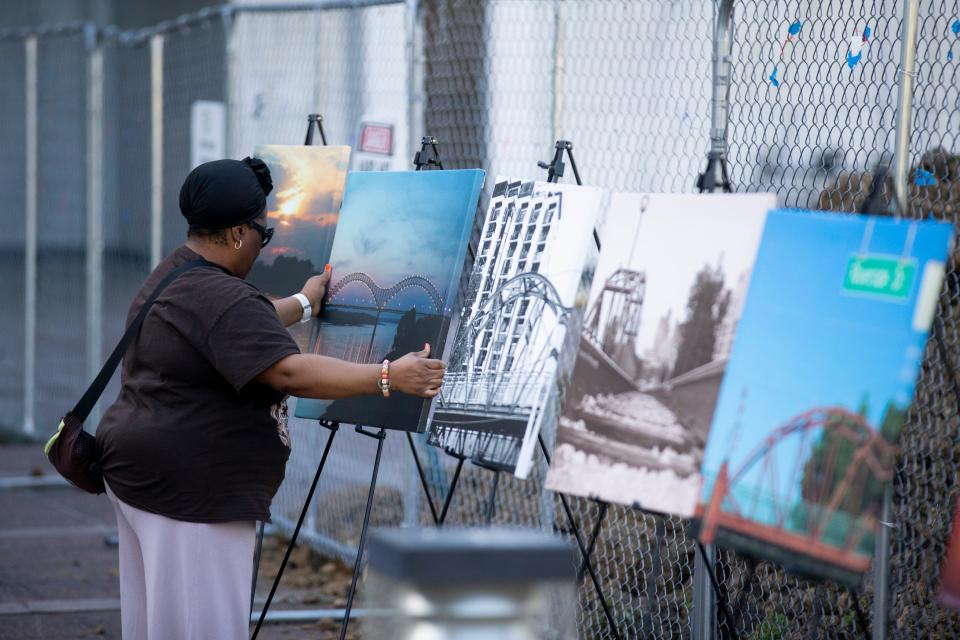
City Council bans, silencing of public comment draws ire
While advocates praised the passage of the driving equality ordinance, several spoke out against how multiple individuals were banned from meetings of the City Council. One of those banned was Amber Sherman, president of Shelby County Young Democrats.
A day before the meeting, an attorney for the Tennesse Young Democrats wrote the City Council, saying people could not be banned from multiple meetings of a public body.
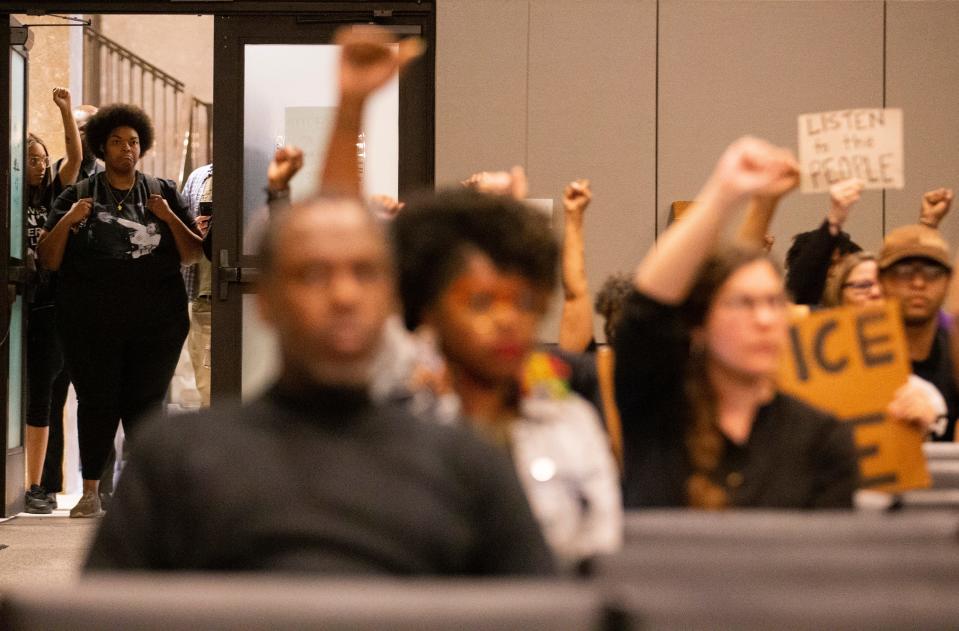
Several residents described the expulsions of state representatives Justin Jones and Justin Pearson by Republicans as “fascism,” saying the city council was also acting fascist by banning city residents from a public meeting.
“Rescind the bans on all the people you have expelled from this space,” said Maria Oceja. “This is the people’s space.”
With some members of the public left wanting to speak, Council Chairman Martavius Jones cut off public comment on the ordinance, calling for the vote.
“You cannot silence the movement,” shouted activist LJ Abraham as she left chambers, followed by a security officer.
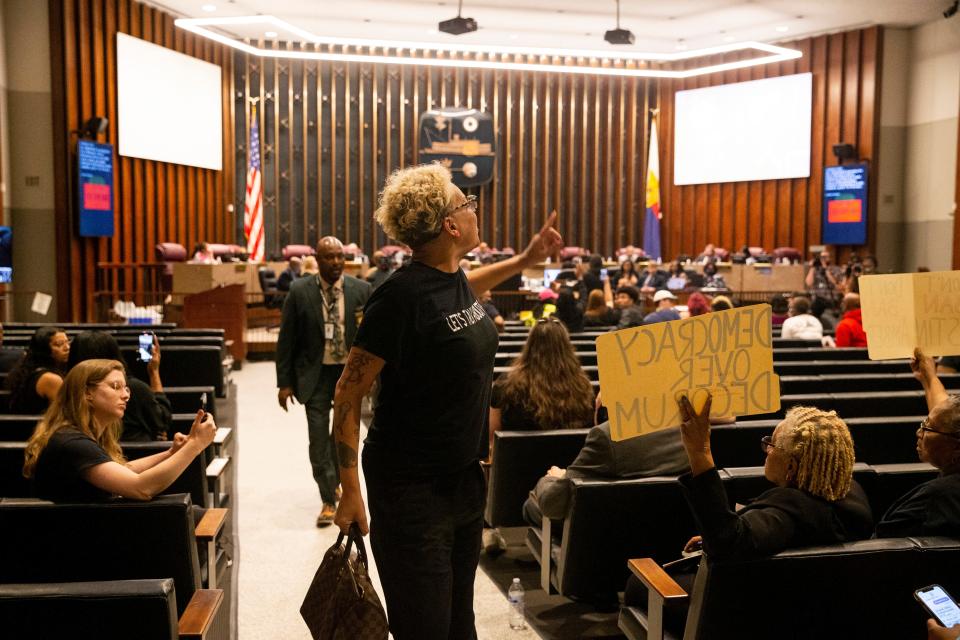
Eleven council members voted in favor of the “Driving Equality” ordinance: Chase Carlisle, Edmund Ford Sr., Cheyenne Johnson, Rhonda Logan, Patrice Robinson, Jana Swearengen-Washington, Frank Colvett, Jeff Warren, Jones, Easter-Thomas and Smiley.
Council members Worth Morgan and J. Ford Canale were not present at the meeting.
There was outcry from the audience as public comments were cut off, with calls of “let them in,” referring to Sherman and the others who were banned for disruptions of previous meetings and use of profanity.
Sherman entered the lobby of City Hall, but was not allowed into chambers. There, she stood at the door, blocked by security officers, until the meeting adjourned. For a time, she and others shouted personal derogatory comments at the council's head of security.
Later, they called out, “Martavius, Martavius,” urging the chairman to speak to them in the lobby.
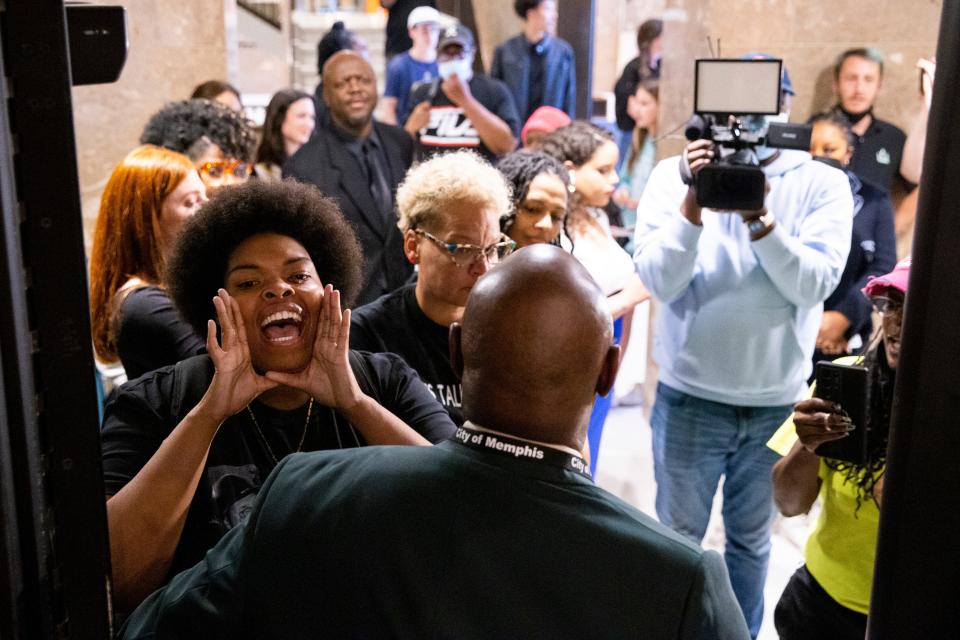
“I think the City Council Chairman Martavius Jones is targeting people who are outspoken,” Sherman said. “He himself called me a ringleader and I think that’s very targeted language to use against folks who’ve been advocating and want to see change.”
After the meeting, Jones told members of the media, “For (Sherman) to continue to act in a disruptive manner, we cannot conduct the city’s business in that manner,” Jones said.
As the meeting adjourned, Sherman yelled from the doorway: “See y’all at the next meeting.”
Outside, Abraham talked with others about how the passages of the ordinances are just the beginning, and that the council needs to stop silencing the voices of the people it represents.
"The ordinances were just the bare bones of what it looks like for justice in Memphis," Abraham said.
Advocates call for change that honors Tyre Nichols
A day before City Council met, a group of about 40 community members gathered outside City Hall to remember Tyre Nichols’ life, 90 days after he died, and call for the passage of the driving equality ordinance.
“It shouldn’t be this hard,” said the Rev. Andre E. Johnson, senior pastor at Gifts of Life Ministries. “The justice for Tyre campaign has done wonderful work in bringing facts and figures and research about the atrocities of pretextual stops. It should not be this hard to get people to understand how Black folks are treated in this city. It should not be this hard to do what is right.”
A group of speakers stood in front of Nichols’ photography that had been printed onto canvasses. The pictures mainly consisted of sunsets over Memphis, a sight his parents said he would regularly set aside time to watch.
“Y’all see these beautiful works of art?” asked Trinity Williams, an activist and student at Rhodes College. “Every aspect of color, every aspect of creativity, every aspect of individuality is represented in his artwork. In the wake of his death, do you know what the officers did? They stepped on his artwork…They told him that his God-given talent was not worthy of being seen.”
Richard Massey, a student activist at the University of Memphis, shared Johnson’s sentiment about the ordinance not being a radical ask, saying minor stops can be predatory, and lead to negative interactions with police.
“We’ve already seen this legislation in Los Angeles and Philadelphia…and now it’s being debated in Memphis,” Massey said. “It’s up in the air in Memphis as if it’s some kind of radical concept. We’ve demanded an end to pretextual traffic stops in order to ensure that people aren’t pulled over on the basis of their income because they can’t afford to fix their broken taillight at the moment. We’re demanding that dangling an air freshener, or graduation tassels, doesn’t serve as the precursor to the death of Black and brown people.”
Katherine Burgess covers government and religion. She can be reached at [email protected] or followed on Twitter @kathsburgess.
This article originally appeared on Memphis Commercial Appeal: Memphis passes 'Achieving Driving Equality' after Tyre Nichols' death
